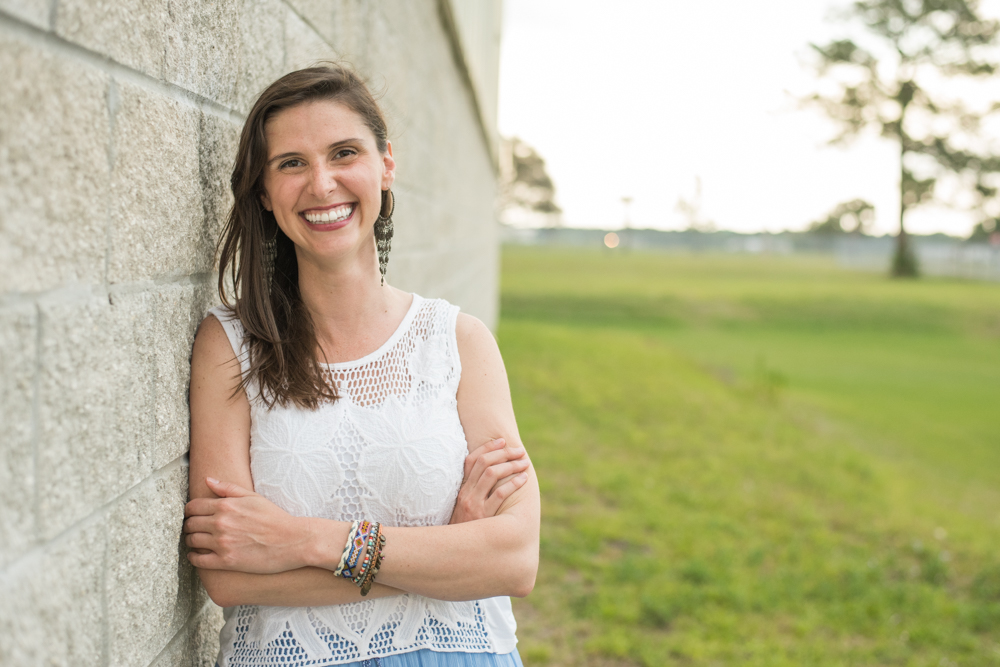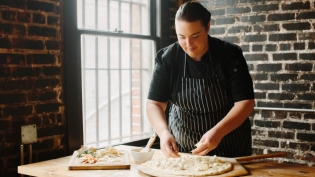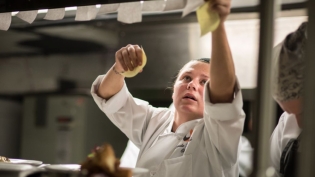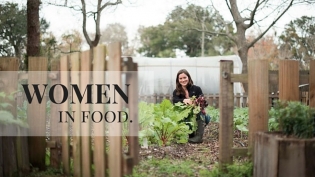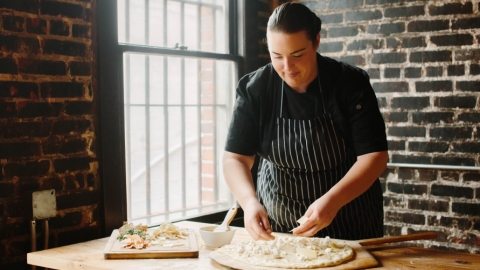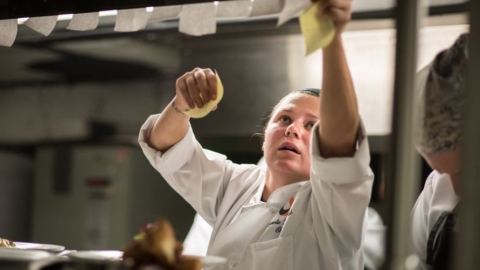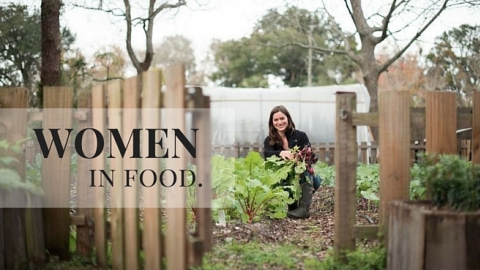Cari Sanchez-Potter and The Pursuit of Local Food Cultures
Cari Sanchez-Potter followed a zig-zag career path that landed her in Northeast Florida. Since her arrival several years ago, she has been a major force in defining the food culture and identity of Jacksonville. Cari has experienced firsthand the positive benefits of collaborative culinary interactions and how they create connections between different parts of our cultural community, enhancing the quality of life for residents throughout the area.
You have a Master's of Gastronomy, a degree that is not very common. What is your background that led you to pursue studies related to food and culture?
I grew up in a small town in Northeast Ohio and went to college in Boston to study business with dreams of making a splash in the world of marketing, so my path to gastronomy was a bit unexpected. I’ve been fortunate to live on five different continents and have always loved to travel. For me, the best part of visiting new places is exploring local culinary cultures and seeking out the unique in terms of food. So, after holding various positions in the non-profit and event planning worlds in Boston, I realized my passion was in learning more about food cultures. My husband and I decided to change directions in our careers together and we pursued Masters degrees in Australia. Honestly, I had no idea what my career path would look like! It’s been rewarding and challenging to apply the knowledge I gained during my gastronomy studies to our local food scene here in Northeast Florida. I’ve come to realize that food can be a powerful economic and cultural driver, and I’ve seen firsthand how it has shaped our community in the years since I moved to Jacksonville.
Since you arrived in the area, you have been actively working to elevate the culinary scene and make Northeast Florida a food destination. What are some of the challenges to creating a culinary identity in the region?
I think one of the keys to creating a culinary identity is to identify the ingredients, traditions, rituals and dishes that are unique to our region. I really struggled with this when I first moved to Jacksonville, as it wasn’t immediately apparent what defined our food culture. After living in places that have “signature” dishes and elements that obviously define their food cultures, at first I was a bit frustrated. Jacksonville is located in Florida, but we don’t have the strong Latino influences and “Floribbean” elements that can be found in the southern portion of the state. My friend Chef Scotty Schwartz taught me about the “Sweet Tea Line” that runs across the state through Orlando, and since we’re located above that we really have more in common with Southern food traditions than those typically associated with other parts of Florida. Since we’re located on the coast, I started to see lots of seafood elements like shrimp and grits, but those dishes aren’t unique to our area and we can’t claim them as strictly our own. I think we’re still wrestling with our food identity here. A burgeoning craft beer scene has popped up since I moved here, and our local breweries are helping shape our story. We also have so many folks from different backgrounds who live here, and I’d love for the influences of our Vietnamese, Filipino, Indian and other cultural communities to be widely considered an integral part of the fabric of our local food identity.
You were one of the first employees at Intuition Ale Works - what was it like helping to get a craft brewery up and running?
The experience of helping create a brand identity from scratch with an organization like Intuition is easily one of the most rewarding and fulfilling professional and personal experiences I have ever had. It tied me to the community in a lasting and profound way. Intuition's dedication to the quality of their product certainly made my job much easier, and the timing of Intuition’s entry to the scene really couldn’t have been any better. It was so fun being the “beer girl” for a while!
I really felt like Intuition was a catalyst for growth for both the neighborhood and our beer and food scenes in general. Since the brewery opened in 2010, the craft beer industry in Jacksonville has become a source of local cultural pride and a shining star of the region’s economic development. We gained statewide notoriety by being the first craft brewery in Florida to offer our products in cans, Intuition played a major role in kicking off a local craft beer culture that is helping give an identity to Jacksonville. The craft beer industry is also providing job opportunities and enhancing quality of life through cultural festivals, events, civic engagement and charitable contributions. It was exhilarating to be a part of all that, and I can’t thank Ben and Intuition enough for being the springboard for my career in food and for teaching me about the power of community engagement.
As one of the founders of the The Legend Series, why did you feel that Jacksonville was ready for a more innovative approach to dining events? How can these types of pop-up dinners serve to enrich our culinary landscape?
I’ve attended pop-up events in cities around the world and realized the concept was missing from our local dining scene. People are hungry for unique events and are looking for ways to engage with food in new ways. Because attendees to the events tend to be adventurous diners, the chefs have a chance to play and experiment by cooking dishes they don’t typically serve at their restaurants. The hope is that little by little, this experimentation helps push the culinary boundaries in our city, and the popularity of The Legend Series proves there is a demand for unique culinary experiences.
An unanticipated benefit of our events is that they not only shine a spotlight on our incredible local culinary talent, but they also provide opportunities to create connections between different parts of our cultural community. We always incorporate an art or music element into the events, and the venues we choose usually expose attendees to places that tell a story about our city’s history and identity. Bringing all of these elements together helps create a sense of pride, a sense of identity and a sense of place.
We talk a lot about consumers, chefs, restaurants, artisans and farms working together as a "food system." What are some of the ways that this system can evolve to help solidify the culinary identity in the region?
One of the best aspects of our culinary scene is that our chefs, artisans and farmers are so open to and excited about collaboration. I think that sets us apart from other cities, and The Legend Series couldn’t exist without this “a rising tide raising all ships” mentality. We do however need to be more deliberate about our conversations by engaging and connecting leaders from all aspects of our food system in order to create a plan for taking us to the next level.
Is there something, in particular, that draws you to food? If so, what is it and how has it captured your attention?
Food is so much more than just what is on your plate. From an ordinary meal, to the “signature” dish of our hometown, to a multi-course epicurean experience at a fancy restaurant, every meal has an incredible story to tell and can teach us so much about ourselves and others. Just one dish represents elements of history, climate, culture, immigration, religion, economy, traditions, taboos, geography and of course, identity. We all think about food every day, and our choices shape us and allow us to express where we come from and who we are. Because of this, I’ve found that food is one of the greatest bridges between people. Everyone has an opinion about food! It’s endlessly fascinating to me and a never-ending source of learning, conversation and camaraderie wherever I find myself in the world.
You dine out a lot, so does that mean you don't like to cook? Or do you have occasion to cook at home? If so, what type of cuisine do you most enjoy preparing?
My love of food began in the kitchen, and it’s definitely the room where I spend the most time (well, except for my office as of late!). Cooking is my major source of relaxation. I love having friends over for an elaborate, multi-course meal, but I take just as much pleasure in serving a simple dinner to my husband as often as possible. We recently turned our front yard into a bountiful edible landscape and have already gotten so much pleasure from harvesting ingredients for our meals right outside our front door.
I have a large collection of cookbooks. Most of them focus on global cuisines, and usually the meals I make at home are dishes I can’t find in restaurants here in Northeast Florida. As I think back on my home-cooked meals from the last month or so, I’ve cooked dishes representing the cuisines of Morocco, Japan, South India, Spain, Italy, Thailand, the Netherlands, Russia, Korea, Argentina, Mexico and Puerto Rico! I love to travel and learn about other cultures, and cooking is a way for me to transport myself to another place on a daily basis.


